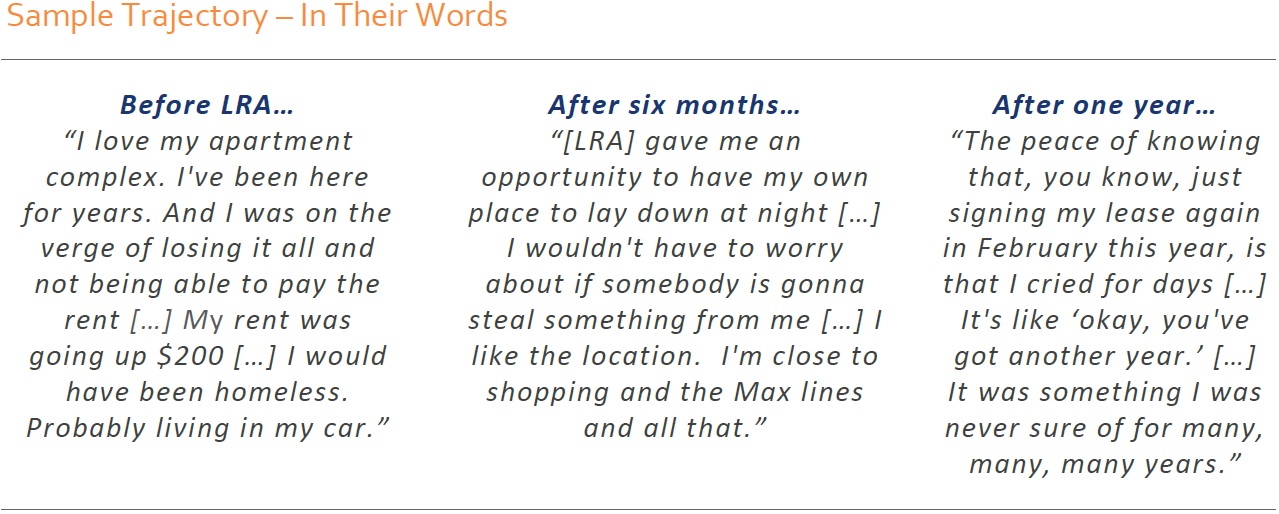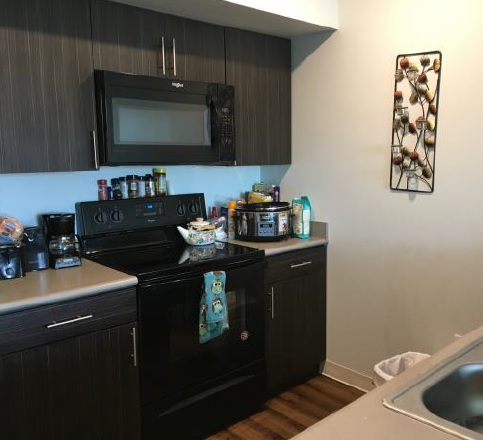LRA Evaluation: Executive Summary
The Long-term Rent Assistance (LRA) Evaluation
In 2018, the Center for Outcomes Research and Education (CORE) was contracted by Northwest Pilot Project
(NWPP) to conduct a longitudinal qualitative evaluation of the Long-term Rent Assistance (LRA) program. The
evaluation had one main objective: To explore the initial impacts of a long-term rent subsidy on a person’s life
and wellbeing. Through interviews, we asked participants to tell us about how their lives have changed since
joining the LRA program at six- and 12-months post receipt of their first subsidy, and to compare their current
experiences to the time before joining the program. Most questions were open-ended and allowed the
participant to discuss any type of program impact; however, we also asked some specific questions about
housing stability, physical health, mental health, and financial impact.
The LRA program
Identifying the housing crisis as a need requiring immediate action, Northwest Pilot Project (NWPP) partnered
with Home Forward, Meyer Memorial Trust, the Joint Office of Homeless Services (funded by Multnomah
County and the City of Portland), JOIN, and CareOregon to pilot a new funding mechanism in 2017 called the
Long-term Rent Assistance (LRA) program. LRA focuses on two vulnerable populations in Multnomah County:
rent-burdened or homeless seniors, and others experiencing (or at serious risk of) homelessness. LRA started
with as a small pilot of 45 participants to test the effectiveness of the model. We interviewed 22 participants
between October 2018 and May 2019. The LRA pilot ran from January 2018 to June 2019 but the rent subsidies
are ongoing.
Findings
We identified five themes of potential impact from the longitudinal interviews: Housing Security, Financial
Health, Mental Health, Health & Health Access, and Social Support & Leisure.
Housing Security
The overall goal of the LRA program is to provide individuals with secure housing for the foreseeable future.
For participants, this was an immediate and later sustained impact of the program. Initially, LRA gave
participants “peace of mind” and confidence about maintaining their housing. Eventually, participants
described housing concerns as being nearly non-existent. LRA also provided participants with the added
benefits of housing choice and the ability to age in place.
Financial Health
LRA gave participants facing difficult tradeoffs between housing and other expenses a financial buffer.
Many participants now have money left over after paying rent to cover expenses that they would not
have been able to afford prior to LRA like food and utilities, and some can now afford leisure activities
every now and then. Additionally, some participants shared that they are now able to save for the future.
Mental Health
With a newfound sense of housing security and improved financial health, participants told us about
improvements to their general mental health status. It was explained by several participants that LRA
helped clear the “headspace” needed to start to heal from past traumas. Many participants also shared
that feelings of stress and anxiety had reduced after joining the program, and some sought therapy.
Before LRA…
“Anything that cost money was kind
of a struggle, and occasionally I
would get help, but that’ s one of the
biggest things, just general things
you don’t think about, where I
would have to go somewhere and
gather this or that from maybe a
pantry.”
After s ix months…
“It’s allowed me to pay for my
basic needs, which, before this,
my family and friends were kind
of pitching in […] now I can pay
my own utilities, and groceries,
and, you know, go out to eat
once in a while.”
After one year…
“We can go to Oaks P ark.
We can go to that
waterfall, Multnomah
Falls […] We can afford,
you know, weekends, and
we go to [family
member’ s] house.”
To read the full evaluation, click here…
The Executive Summary
The Executive Summary provides a high-level, concise overview of the full LRA Evaluation Final Report. It
highlights the key findings related to the impact of the program on participants as well as additional findings,
methods, and implications. For additional context, please refer to the full evaluation report. Questions about
this summary or the full report? Contact Natalie Kenton, MS, MPH ([email protected]), or Kayla
McMenamin, MPH ([email protected]).
LRA: Final Evaluation Executive Summary | July 2019 | CORE 2



